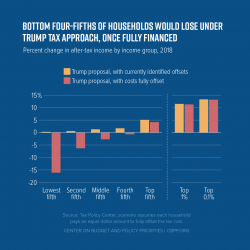
President Trump has promised to pass federal “tax reform” that will create jobs and higher wages and provide middle-class tax relief. How to fulfill this promise will be one of the big issues facing the U.S. Congress when it reconvenes today. Unfortunately for Arkansas families, it’s looking like the plan will be less about “reform” and middle-class tax relief and more about tax cuts for profitable corporations and the wealthy, made possible by huge federal budget cuts.
While we know the broad strokes of the Trump tax plan, many of the important details have yet to be provided. It will be up to the House Ways and Means Committee to fill in those details and write the legislation. Most of what we know about the Trump tax plan comes from a single-page proposal the Trump administration released in April. The major proposals include:
- Repeal of the 3.8 percent tax on investment income.
- Repeal of the alternative minimum tax (AMT).
- New brackets of 10, 25, and 35 percent.
- A lower 15 percent rate for pass-through businesses.
- Doubling the standard deduction.
- Repealing itemized deductions except for mortgage interest and charitable giving.
- Repeal of personal exemptions.
- A deduction and credit for child care.
- Repealing breaks for pass-throughs businesses.
- Repealing breaks for corporations.
- Repealing the Estate Tax. (Note: for a detailed explanation of all these changes, see the this report.)
Who benefits and who loses under the Trump tax plan? An analysis by the Institute on Taxation and Economic Policy (ITEP) estimates that Arkansas would fare worse under the plan compared to other states. Relative to our share of the U.S. population, we would be one of the 12 states receiving the lowest share of the total Trump tax cut.
The wealthy, not the middle class, would be the major winners under the Trump plan. ITEP estimates the total cost of this plan would be $4.84 billion over the 10-year period from 2018-2027. In Arkansas, the richest 1 percent of taxpayers, those with incomes of more than $490,000, will receive half (49.5%) of the benefits from the Trump plan. The 40 percent of Arkansas taxpayers who earn the least, those with incomes less than $35,000, will receive less than 4 percent of the total benefits from the proposed tax cuts. In contrast, Arkansas millionaires would do well. If you make more than $1 million a year, you would receive an average tax cut of $216,000 annually.
The Trump tax plan doesn’t include enough revenue raisers or close enough tax loopholes to pay for itself. As noted in a recent article by the Center on Budget and Policy Priorities, eventually the cost of the plan would have to be paid for somehow, whether through spending cuts or tax increases.
The Tax Policy Center also analyzed the Trump plan and the impacts it would have if it were paid for through spending cuts similar to those favored by the Trump administration and congressional Republicans. This means cutting federal programs that are critical to the well-being of Arkansans, things like Medicaid, SNAP, Pell grants, after school programs, public health, and education just to name a few. Under this scenario, most American households would be net losers, meaning they would lose more from the spending cuts than they would gain from benefits of the tax plan. The bottom 40 percent of taxpayers would, on average, lose more than $2,000 per year. The middle class (the middle 20 percent of taxpayers) would on average lose $1,500. In contrast, the taxpayers at the very top (the richest 0.1 percent of taxpayers, would see an average positive benefit of more than $935,000.
But the damage doesn’t stop there. There is also the potential downward pressure the Trump plan could have on lowering worker wages. The plan includes a provision for a “territorial” tax system, which would exempt foreign profits earned by American multinational corporations. If U.S. companies moved their investments off shore to avoid having their profits taxed – which many would do — it would likely encourage companies to lower the wages paid to U.S. workers. This could have major impacts in a state like Arkansas, where workers already earn lower wages than those in other states.
The Trump administration justifies these tax policy changes on the grounds that they’re needed to grow the economy. But if history has taught us anything over the last 30 years, it’s that federal tax cuts targeted to the wealthy are not sufficient to grow the economy. We also know from experience that the benefits are unlikely to trickle down from the top to low-income and middle-class families. These families are also the most likely to be hurt the most from the spending cuts that would undoubtedly happen to pay for the tax cuts. Arkansas families should expect, and demand, a better tax reform package from the Trump administration and Congress.
